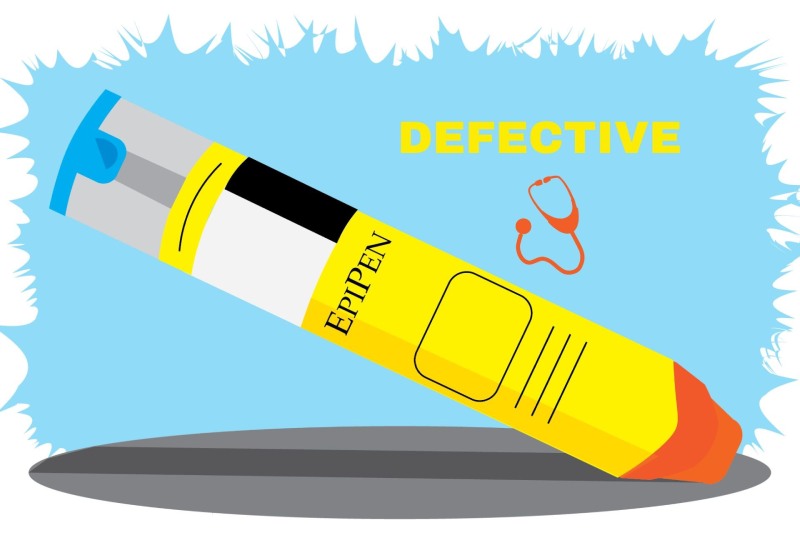Lifestyle
Are the Sellers Liable for Defective EpiPen Products?
The EpiPen is a lifesaver for those who suffer from life-threatening allergies. Still, the devices have come under intense scrutiny in recent months after more than 400 complaints of the device not working correctly were reported. It was reported that some EpiPen users were found not to experience a reaction because they did not have the device inserted correctly.
EpiPen is a lifesaver, but there are chances that it can fail. If you are an EpiPen user, it is essential to learn more about EpiPen failures to act accordingly in the event of an EpiPen failure.
Epinephrine auto-injectors are considered the first line of defense against anaphylaxis, an acute, life-threatening allergic reaction that occurs within minutes of exposure to specific allergens. The mechanism behind these devices is simple: a person with a severe allergy holds the device against their thigh and pushes down on it until it injects its prescribed dose of epinephrine.
Situations When Sellers are Liable for Defective EpiPen Products
1. When it is Defective in its Manufacture
The seller is liable if the EpiPen was either faulty during production or was substandard. The defendant must prove that the pen was working as intended and that a person using the product by its guidelines could rely on its effectiveness.
2. When it is Defective Due to the Lack of Adequate Instructions or Warnings
People using the EpiPen must be aware of how the product should be used and what the risks are, as well as these risks being clearly outlined to those buying and selling. If someone with an allergy is unaware of how to use this device effectively, they may take it off their thigh and into their hand, significantly reducing its effectiveness.
To establish liability, the defendant must prove that:
a. The EpiPen had an adequate instruction manual that contained clear warnings about the risks of misusing it.
b. The plaintiff read and understood the instructions outlined in the manual but still misused the product.
3. When the Defect Occurred in Transit
If the buyer immediately noticed that the product was not working correctly and notified the seller, they would act prudently and under general expectations of good faith. However, if they received the device used without reading the instructions or warnings and failed to notice this, they could be liable for failing to come forward with these facts.
4. If the Product is Defective Without being Replaced
Those with a dangerous allergy that must use an EpiPen should keep it in a safe place and not allow anyone to use it on them. If it is taken away from the user, then this fact could serve as evidence that the user left out essential facts about how to use this product.
5. If the Product is Defective Because its Labeling is Misleading
The EpiPen can only be used to treat anaphylaxis. If a user is found to have used it for something other than its intended purpose, this fact could serve as evidence that the defendant did not make reasonable efforts to ensure that the product was being used correctly.
When it comes to when the seller is liable for defective EpiPen products, liability depends on several factors and should be settled by a legal representative. If you or someone you know has been using EpiPen and experienced severe side effects after using them, contact any law firm to file a lawsuit.
-
Health3 weeks ago
Back to Roots: Ayurveda Offers Natural Cure for Common Hair Woes
-

 Tech3 weeks ago
Tech3 weeks agoFrom Soil to Silicon: The Rise of Agriculture AI and Drone Innovations in 2025
-

 Science1 week ago
Science1 week agoJuly Full Moon 2025: Everything You Should Need to Know, When and Where to See Buck Moon
-

 Sports3 weeks ago
Sports3 weeks agoFIBA 3×3 World Cup 2025: Full Schedule, Preview, and How to Watch
-

 Gadget4 weeks ago
Gadget4 weeks agoThings to Know about Samsung Galaxy S26: What’s New and What’s Next
-

 Tech4 weeks ago
Tech4 weeks agoAdobe Firefly App Now Available on iOS and Android Phones to Create AI Images and Videos Anywhere
-

 Sports2 weeks ago
Sports2 weeks agoPrefontaine Classic 2025: Full Schedule, Preview, Field, Events and How to Watch Diamond League Eugene Live
-

 Festivals & Events4 weeks ago
Festivals & Events4 weeks agoEverything You Should Need to Know about Summer Solstice 2025














